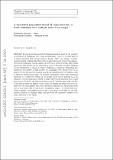A structured population model of clonal selection in acute leukemias with multiple maturation stages
Abstract
Recent progress in genetic techniques has shed light on the complex co-evolution of malignant cell clones in leukemias. However, several aspects of clonal selection still remain unclear. In this paper, we present a multi-compartmental continuously structured population model of selection dynamics in acute leukemias, which consists of a system of coupled integro-differential equations. Our model can be analysed in a more efficient way than classical models formulated in terms of ordinary differential equations. Exploiting the analytical tractability of this model, we investigate how clonal selection is shaped by the self-renewal fraction and the proliferation rate of leukemic cells at different maturation stages. We integrate analytical results with numerical solutions of a calibrated version of the model based on real patient data. In summary, our mathematical results formalise the biological notion that clonal selection is driven by the self-renewal fraction of leukemic stem cells and the clones that possess the highest value of this parameter are ultimately selected. Moreover, we demonstrate that the self-renewal fraction and the proliferation rate of non-stem cells do not have a substantial impact on clonal selection. Taken together, our results indicate that interclonal variability in the self-renewal fraction of leukemic stem cells provides the necessary substrate for clonal selection to act upon.
Citation
Lorenzi , T , Marciniak-Czochra , A & Stiehl , T 2019 , ' A structured population model of clonal selection in acute leukemias with multiple maturation stages ' , Journal of Mathematical Biology , vol. First Online . https://doi.org/10.1007/s00285-019-01404-w
Publication
Journal of Mathematical Biology
Status
Peer reviewed
ISSN
0303-6812Type
Journal article
Description
Funding: TS and AM-C were supported by research funding from the German Research Foundation DFG (SFB 873; subproject B08). TL gratefully acknowledges support from the Heidelberg Graduate School (HGS).Collections
Items in the St Andrews Research Repository are protected by copyright, with all rights reserved, unless otherwise indicated.

